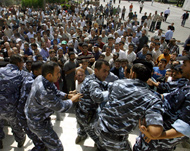Strike shows political divisions in Gaza
Thousands of unpaid teachers began the Palestinian school year with a strike that shut down schools across the West Bank and Gaza, as Hamas deployed armed men around schools to try to persuade teachers and students to attend.

Civil service and health workers unions joined teachers in Saturday’s walkout, making a total of 80,000 strikers.
Fadi al-Asali, 15, a student in Gaza city, said: “Teachers have the right to demand good living conditions, but we also want to study. I hope this strike will be over soon because the losers are the Palestinians.”
Saturday’s strike has been widely viewed as a tactic by Fatah, lead by the moderate Palestinian president, Mahmoud Abbas, to pressure Hamas to join it in a so-called national unity government.
Saadiya Abu Saud, a teacher, who was clutching the hand of a crying first-grader in the yard outside Nablus’ Rafidieh school said: “It’s the first day of school. The children needed someone to greet them… I don’t support the strike.
“They’re driving us crazy, both Fatah and Hamas. They haven’t done anything to get the Palestinian people ahead.”
Many teachers in Gaza and other Hamas strongholds opposed the strike, but honoured it because they were outnumbered by colleagues loyal to Fatah.
Wasfi Kibha, the Palestinian education minister and a member of Hamas, claimed that 95 per cent of the schools in Gaza and more than 50 per cent of schools in the West Bank had operated to some degree.
Political tensions
Hamas, which took office in March after winning legislative elections, has rejected international calls to renounce violence and recognize Israel’s right to exist, despite sanctions by Israel and Western donors that have bankrupted the government.
 |
|
The unemployed protest in |
The government has so far enjoyed public support during the 6-month-old crisis. But with schools closed, that may change if people conclude that Hamas’ ideology is jeopardizing their children’s education and the future prosperity of Palestine.
Sami Abu Zuhri, a Hamas spokesman said: “This strike has nothing to do with the suffering of our people. This strike is politically motivated.”
He said the strike threatened to undermine ongoing negotiations between Hamas and Fatah aimed at forming a unity government.
Unity government
A top Palestinian decision-making body headed by Abbas accused Hamas on Saturday of stalling in talks to form a national unity government, contradicting earlier claims that the sides were making progress.
Returning to his West Bank headquarters after four days of negotiations with Ismail Haniyeh, the prime minister of Gaza, Abbas had expressed some optimism. Nabil Abu Rdeneh, aide to the president, said that he expected a unity government within 10 days.
Halil al-Haya, a top Hamas lawmaker who leads the party’s negotiating team, said Abu Rdeneh may be over optimistic.
“The Palestinians have nothing but education. This strike will be a strong card to pressure the government” Hani al-Masri, |
“We hope that the formation of this government can be reached as soon as possible but setting times and dates is something we cannot do.”
Hamas, reluctant to yield power, has previously balked at calls for a unity government, and it was unclear whether the latest pledges signaled a change.
Meanwhile, Palestinians were still suffering from the political deadlock and the latest strike is sure to put pressure on the government.
Hani al-Masri, a political analyst said: “The Palestinians have nothing but education. This strike will be a strong card to pressure the government. If it works, it will shorten its life. But if it fails, the life of the government will be prolonged.”